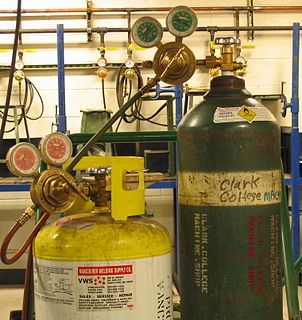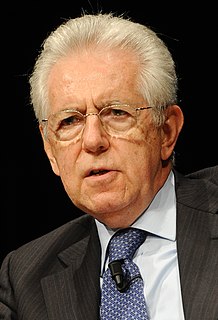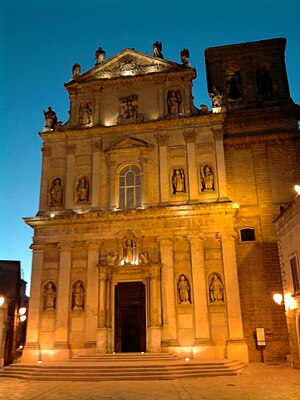
Giovanni Falcone was an Italian judge and prosecuting magistrate. From his office in the Palace of Justice in Palermo, Sicily, he spent most of his professional life trying to overthrow the power of the Sicilian Mafia. After a long and distinguished career, culminating in the Maxi Trial in 1986–1987, on 23 May 1992 Falcone was assassinated by the Corleonesi Mafia in the Capaci bombing, on the A29 motorway near the town of Capaci.
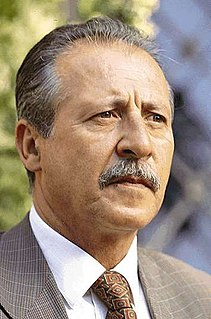
Paolo Borsellino was an Italian judge and prosecuting magistrate. He was killed by a Mafia car bomb in Palermo, 57 days after his friend and fellow Antimafia magistrate Giovanni Falcone was assassinated in Capaci. He is considered to be one of the most important magistrates killed by the Sicilian Mafia and he is remembered as one of the main symbols of the battle of the State against the Mafia. They were both killed in 1992, a few months apart. In recognition of their tireless effort and sacrifice during the anti-mafia trials, they were both awarded the Italian "Medaglia d'oro al valore civile". They were also named as heroes of the last 60 years in the 13 November 2006 issue of Time Magazine.
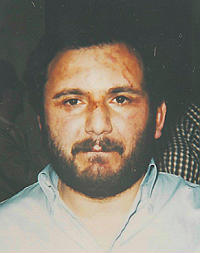
Giovanni Brusca is an Italian former member of the Sicilian Mafia. He murdered the anti-Mafia prosecutor Giovanni Falcone in 1992 and once stated that he had committed between 100 and 200 murders but was unable to remember the exact number. He was sentenced to life in prison in absentia, captured in 1996 and started to cooperate with the authorities.

The Maxi Trial was a criminal trial against the Sicilian Mafia that took place in Palermo, Sicily. It lasted from 10 February 1986 to 30 January 1992.
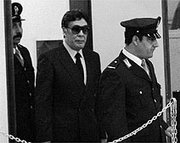
The Pizza Connection Trial stands as the longest criminal jury trial in the federal courts in U.S. history. The trial began on September 30, 1985 and ended with convictions of all but one of the 22 defendants on March 2, 1987.

Leoluca Bagarella is an Italian criminal and member of the Sicilian Mafia. He is from the town of Corleone. Following Salvatore Riina's arrest in early 1993, Bagarella is believed to have taken over a section of the Corleonesi, rivalling Riina's putative successor, Bernardo Provenzano. Bagarella was arrested on June 24, 1995, having been a fugitive for four years, and was later sentenced to life imprisonment.

Organized crime in Italy and its criminal organizations have been prevalent in Italy, especially Southern Italy, for centuries and have affected the social and economic life of many Italian regions since at least the 19th century.

Salvatore Cancemi was a member of the Sicilian Mafia from Palermo. He would be the first member of the Sicilian Mafia Commission that turned himself in voluntarily and became a pentito, a collaborator with the Italian judicial authorities. Cancemi made controversial allegations about the collusion of Prime Minister Silvio Berlusconi and his right-hand man Marcello Dell'Utri with the Mafia.

The Corleonesi are a faction within the Sicilian Mafia that dominated Cosa nostra in the 1980s and the 1990s. The informal name Corleonesi was applied by the media and government because its most important leaders came from the town of Corleone, first Luciano Leggio and later Totò Riina, Leoluca Bagarella, Riina’s brother-in-law, and Bernardo Provenzano.

Gaspare Mutolo is a Sicilian mafioso, also known as "Asparino". In 1992 he became a pentito. He was the first mafioso who spoke about the connections between Cosa Nostra and Italian politicians. Mutolo’s declarations contributed to the indictment of Italy’s former Prime Minister Giulio Andreotti and to an understanding of the context of the 1992 Mafia murders of the politician Salvo Lima and the magistrates Giovanni Falcone and Paolo Borsellino.

The Pizzolungo Bombing was a car-bomb attack on 2 April 1985 undertaken by the Sicilian Mafia in order to kill Carlo Palermo, a magistrate in Pizzolungo, Sicily. Palermo had been investigating an international drug and arms trafficking network in which Italian politicians may have been involved. Palermo was injured in the attack and three passersby were killed: Barbara Rizzo and her young twin sons, Salvatore and Giuseppe Asta.

Salvatore "Totò" Riina, called Totò 'u Curtu, was an Italian mobster and chief of the Sicilian Mafia, known for a ruthless murder campaign that reached a peak in the early 1990s with the assassinations of Antimafia Commission prosecutors Giovanni Falcone and Paolo Borsellino, resulting in widespread public outcry and a major crackdown by the authorities. He was also known by the nicknames la belva and il capo dei capi.
The Train 904 bombing was a terror attack which occurred on 23 December 1984, in the Apennine Base Tunnel. A bomb on the 904 express train from Naples to Milan was detonated, killing 16 and wounding 266. The bombing location was near the location of the Italicus Express bombing ten years previously.

The via dei Georgofili bombing was a terrorist attack carried out by the Sicilian Mafia very early in the morning on 27 May 1993 outside the Uffizi in Florence, Italy.

A propane bomb is a type of improvised explosive device which uses commercially available bottled gas cylinders, a kind of BLEVE. The devices have been used in terror attacks and school bombing plots.

The Capaci bombing was a terror attack by the Sicilian Mafia which took place on 23 May 1992 on Highway A29, close to the junction of Capaci, Sicily. It killed magistrate Giovanni Falcone, his wife Francesca Morvillo, and three police escort agents, Vito Schifani, Rocco Dicillo and Antonio Montinaro; agents Paolo Capuzza, Angelo Corbo, Gaspare Bravo and Judge Joseph Giuseppe Costanza survived.
The term State-Mafia Pact defines the negotiation between important Italian functionaries and Cosa nostra members, that began after the period of '92 and '93 terror attacks by the Sicilian Mafia with the aim to reach a deal and so to stop the attacks. In summary, the supposed cornerstone of the deal was the end of the so called "massacres season" in return for detention measures attenuation expected by Italian article 41-bis, thanks to which Antimafia pool led by Giovanni Falcone condemned hundreds of mafia members to the so called "hard prison regime". The negotiation hypothesis has been the subject of long judicial investigations - not yet concluded - and some journalistic investigations.





